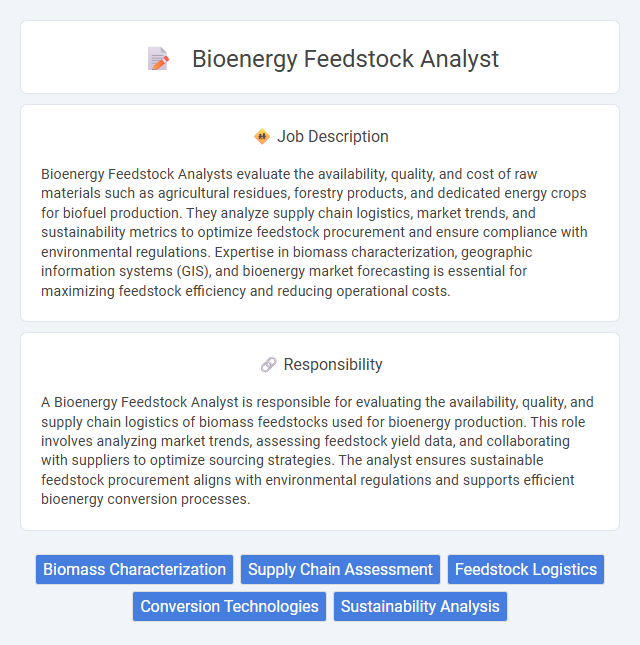
Bioenergy Feedstock Analysts evaluate the availability, quality, and cost of raw materials such as agricultural residues, forestry products, and dedicated energy crops for biofuel production. They analyze supply chain logistics, market trends, and sustainability metrics to optimize feedstock procurement and ensure compliance with environmental regulations. Expertise in biomass characterization, geographic information systems (GIS), and bioenergy market forecasting is essential for maximizing feedstock efficiency and reducing operational costs.
Candidates with strong analytical skills and a background in environmental science or agronomy are likely suitable for a Bioenergy Feedstock Analyst role. Those who are comfortable working with data, assessing biomass quality, and understanding supply chain dynamics might find themselves well-matched to the job's demands. People lacking attention to detail or interest in sustainable energy solutions may find the position less fitting for their strengths.
Qualification
A Bioenergy Feedstock Analyst requires a strong background in agricultural science, environmental studies, or bioengineering, combined with expertise in biomass evaluation and supply chain logistics. Proficiency in data analysis, geographic information systems (GIS), and understanding of sustainable feedstock sourcing are essential qualifications. Experience with market trends, regulatory frameworks, and lifecycle assessment tools enhances the ability to optimize bioenergy feedstock selection and utilization.
Responsibility
A Bioenergy Feedstock Analyst is responsible for evaluating the availability, quality, and supply chain logistics of biomass feedstocks used for bioenergy production. This role involves analyzing market trends, assessing feedstock yield data, and collaborating with suppliers to optimize sourcing strategies. The analyst ensures sustainable feedstock procurement aligns with environmental regulations and supports efficient bioenergy conversion processes.
Benefit
A Bioenergy Feedstock Analyst likely enhances decision-making by accurately assessing biomass resources, which could improve supply chain efficiency and reduce costs. This role probably supports sustainable energy initiatives by identifying optimal feedstocks, contributing to greener energy production. Employers may benefit from better market insights and risk management through the analyst's data-driven evaluations.
Challenge
Bioenergy Feedstock Analysts likely face the challenge of accurately predicting feedstock availability amidst fluctuating agricultural yields and market demands. They may also need to navigate complex data sets to optimize supply chains while ensuring sustainability standards are met. Balancing economic feasibility with environmental impact could remain a persistent difficulty in this role.
Career Advancement
A Bioenergy Feedstock Analyst plays a crucial role in evaluating and optimizing biomass resources for sustainable energy production, providing deep expertise in supply chain logistics, market trends, and environmental impact assessments. Mastery in data analysis tools, renewable energy technologies, and regulatory frameworks enhances opportunities for career growth into senior analyst roles, project management, or strategic consultancy within the bioenergy sector. Continuous skill development in bioinformatics, geographic information systems (GIS), and policy analysis can drive advancement towards leadership positions in clean energy innovation and sustainable resource management.
Key Terms
Biomass Characterization
A Bioenergy Feedstock Analyst specializing in biomass characterization evaluates the physical and chemical properties of various feedstocks such as agricultural residues, forestry byproducts, and energy crops. Their expertise enables the optimization of feedstock selection and preprocessing methods to enhance biofuel yield and combustion efficiency. Proficiency in analytical techniques like proximate, ultimate, and compositional analysis ensures accurate assessment of biomass suitability for bioenergy applications.
Supply Chain Assessment
A Bioenergy Feedstock Analyst specializes in evaluating the supply chain dynamics of biomass resources, ensuring consistent feedstock availability for bioenergy production. They conduct detailed assessments of feedstock procurement, transportation logistics, storage capabilities, and cost-efficiency within regional and global supply networks. Their expertise supports optimizing supply chain resilience, minimizing disruptions, and enhancing the sustainability and scalability of bioenergy projects.
Feedstock Logistics
A Bioenergy Feedstock Analyst specializing in Feedstock Logistics evaluates the supply chain efficiency for sustainable biomass materials, ensuring timely delivery from diverse sources such as agricultural residues, energy crops, and forestry byproducts. This role involves analyzing transportation routes, storage facilities, and inventory management to minimize costs while maintaining feedstock quality and availability for bioenergy production. Expertise in supply chain optimization and market trends drives improved decision-making in feedstock procurement and logistics planning.
Conversion Technologies
A Bioenergy Feedstock Analyst specializing in Conversion Technologies evaluates biomass materials to optimize their suitability for processes like thermochemical and biochemical conversion. They assess feedstock characteristics such as moisture content, energy density, and chemical composition to enhance conversion efficiency and output quality. Collaborating with process engineers, they ensure the integration of sustainable feedstock supplies with advanced bioenergy conversion systems.
Sustainability Analysis
A Bioenergy Feedstock Analyst specializing in sustainability analysis evaluates the environmental impact and carbon footprint of bioenergy feedstocks to ensure alignment with renewable energy standards. They utilize life cycle assessment (LCA) tools and sustainability metrics to optimize feedstock sourcing and production processes, minimizing ecological disruption and promoting resource efficiency. Their expertise supports compliance with sustainability certifications and enhances the overall viability of bioenergy projects.
 kuljobs.com
kuljobs.com